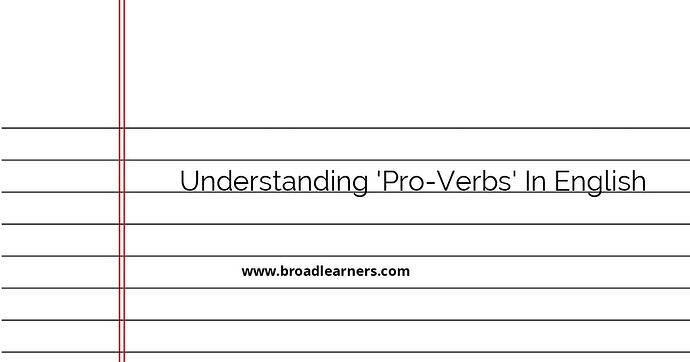Pro-verbs are an integral part of English grammar that function similarly to pronouns, but instead of replacing nouns, they substitute for verbs or verb phrases. Understanding them can enhance language fluency and efficiency in communication.
What are Pro-Verbs?
- Definition:
- Pro-verbs are words that substitute for verbs or verb phrases in a sentence, making the language more concise and avoiding repetition.
Pro-verbs stand in for a verb phrase and often combine with auxiliaries such as do, be, have, and will.
Common Pro-Verbs and Their Uses
Let's explore some common pro-verbs and how they're used in sentences:
- Do/Do So
Do and Do so are often used to replace a verb phrase that has already been mentioned to avoid repetition.
Example:
Original: She wanted to finish her homework, and she did finish her homework before dinner.
Using Pro-Verb: She wanted to finish her homework, and she did so before dinner.
- Be
The pro-verb be assists in situations requiring forms such as am, is, are, was, were to stand in for previously mentioned actions.
Example:
Original: John is happy with the results, and Sarah is happy with the results too.
Using Pro-Verb: John is happy with the results, and Sarah is too.
- Have
The pro-verb have can substitute for completed actions represented by verbs.
Example:
Original: They have completed the project, and she has completed the project too.
Using Pro-Verb: They have completed the project, and she has too.
- Will
Will acts for future actions that have been previously referred to.
Example:
Original: They will attend the meeting, and I will attend the meeting too.
Using Pro-Verb: They will attend the meeting, and I will too.
Benefits of Using Pro-Verbs
- Clarity: Pro-verbs help avoid unnecessary repetition, making sentences clearer and more straightforward.
- Conciseness: They make sentences more concise, which is vital in both written and spoken English.
- Elegance: Using pro-verbs can add elegance and variety to one’s writing or speech.
Conclusion
Pro-verbs are a valuable linguistic tool in English grammar that contribute significantly to the clarity, conciseness, and overall elegance of communication. By understanding and applying them, both beginners and advanced language learners can improve their fluency.
Practice using pro-verbs by substituting them in your own sentences to enhance your English language skills further. As you become more familiar with their use, you'll find your communication more effective and polished.
Did I miss anything? Respond below
